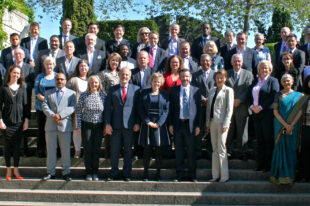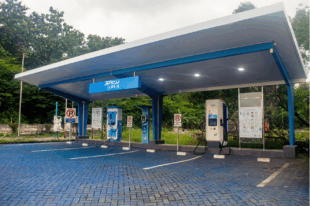Improving Environmental Performance Audits, Cultivating Sustainability

by Sirin Phankasem, Deputy Auditor General of Thailand, and Sutthi Suntharanurak, Auditor, Senior Professional Level, International Affairs Office
Since 2005, the Office of the State Audit Office (SAO) of the Kingdom of Thailand, the nation’s Supreme Audit Institution (SAI), has been responsible for initiating environmental audits, and the SAO gives precedence to environmental issues involving sustainable development. This article depicts the SAO’s three-phase approach in carrying out environmental performance audits and cultivating national and global sustainability.
Phase One: Existing Research
Historically, the SAO conducted environmental performance audits using the 3E principles—Economy, Efficiency and Effectiveness. The SAO, charged with monitoring government compliance with environmental laws, rules, regulations and council of minister resolutions, has sought to improve this approach.
The journey to improving environmental performance audits began in 2005 when the Canadian Audit and Accountability Foundation (CCAF), through fellowships and management internships, supported the SAO in developing a robust environmental audit concept. During this endeavor, the Office of the Auditor General of Canada provided mentorship support.
The CCAF fellowship calls for senior auditors to complete a nine-month placement at a Canadian legislative audit office, while internships allow SAI managers to study managerial practices and develop strategic projects while stationed in Canada.
Dr. Sirin Phankasem, Thailand’s Deputy Auditor General, was selected to participate in the CCAF fellowship program, and during the fellowship, developed a strategic paper on “Moving to Sustainable Development: Focus on Environmental Auditing.”
The paper, a plan that outlined strategies to integrate environmental issues more fully into SAO audit work, emphasized staff cooperation at all levels and continuous policy support to achieve long-term environmental and sustainable development.
The strategy was first implemented within the SAO’s environmental performance audit on noise pollution caused by the Suvarnabhumi Airport, which, since 2006, seriously affected nearby communities.
The International Civil Aviation Organization (ICAO), which oversees airport operations, said that solving the airport’s noise dilemma required specific problem identification and cost effective alternative noise reduction measures.
The proposed measures included: (1) procuring quieter aircraft; (2) land-use planning and management, (3) noise abatement, and (4) revising operational procedures and restrictions. The ICAO developed policies associated with each measure and established a system to collect fees from those causing the noise-related problems to pay for remedies for community members affected by the noise.
The SAO began by evaluating efforts to resolve noise-related issues. Audit objectives included assessing the measures to mitigate problems experienced by those living near the airport affected by elevated noise levels; identifying problems and barriers in dealing with noise impacts; and providing recommendations to solve the problems.
The SAO uncovered three audit findings. While people affected by airport noise were to be compensated, these payments were significantly delayed. The budget for problem resolution for nearby communities suffering from increased noise levels increased sharply. Measures to resolve airport noise pollution were not implemented.
Phase Two: Strengthen Environmental Performance Audits
In 2010, the World Bank supported a grant for SAO development. The SAO selected environmental performance audits as an improvement area and requested academic and technical support from the National Audit Office (NAO) of Estonia. Subsequently, the SAO hosted an international workshop on environmental audits, where NAO Estonia audit staff shared experiences in recognizing and understanding sustainable development concepts and executing environmental performance audits.
With funding support from the Die Deutsche Gesellschaft für Internationale Zusammenarbeit (GIZ) and subject matter assistance from the International Organization of Supreme Audit Institutions (INTOSAI) and the Asian Organization of Supreme Audit Institutions (ASOSAI), the SAO coordinated a planning event for implementing a regional cooperative environmental audit on water issues, which would focus on Mekong River Basin management. The 2012 event signified the first step toward developing and implementing an audit approach for participating SAIs (National Audit Authority of the Kingdom of Cambodia, State Audit Organization of Lao PDR, SAO Thailand, and Vietnam’s State Audit Office). The Audit Board of the Republic of Indonesia and Jabatan Audit Negara Malaysia provided a knowledge base for this cooperative audit.
The audit’s aim—to ensure that water and water-related natural resources within the Mekong River Basin would be well-managed and used sustainably and equitably—was adventurous but successful. Governments of countries along the river basin formed joint practices for transboundary water management.
The SAO’s accumulated audit experiences (the collaborative strategic approach and cooperative audit experiential learning) were shared among SAIs, and the feedback was used to further improve and strengthen environmental performance audits.
Phase Three: Establish the Environmental Audit Office
The SAO founded the Environmental Audit Office (EAO) in 2017 to focus on performance audits and environmental impacts. The EAO, which reviews public contracts, concessions and projects, studies and provides recommendations on government programs having the potential to cause environmental damages. The EAO also has the ability to apply compliance audits to review audited entities’ conformity to EAO recommended actions and international environmental obligations.
Developing environmental performance audits in an effort to prepare for auditing Sustainable Development Goals (SDGs) is crucial and at the forefront of the SAO’s mission.
According to the United Nations Environment Program (UNEP), more than half of the SDGs possess an environmental focus or address natural resource sustainability. With more than 86 targets concerned with environmental sustainability, and each of the 17 SDGs having at least one of these targets, the OAG continues to research auditing SDG implementation in an effort to develop future SDG-related environmental performance audits.





